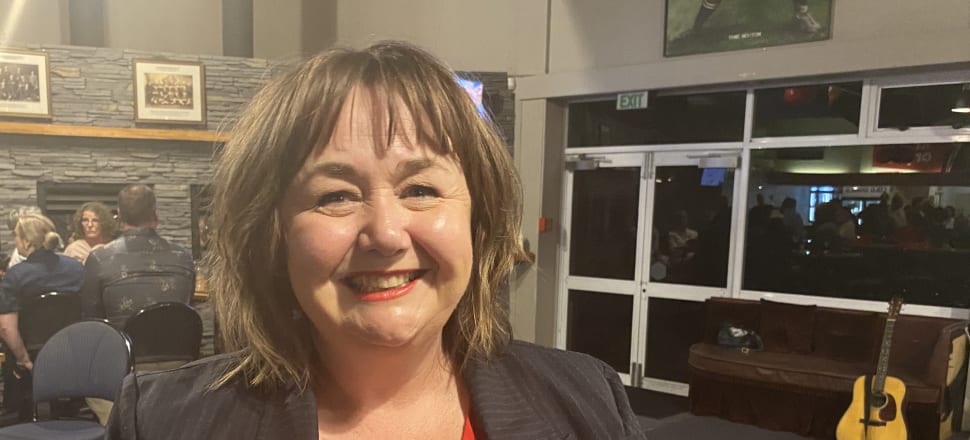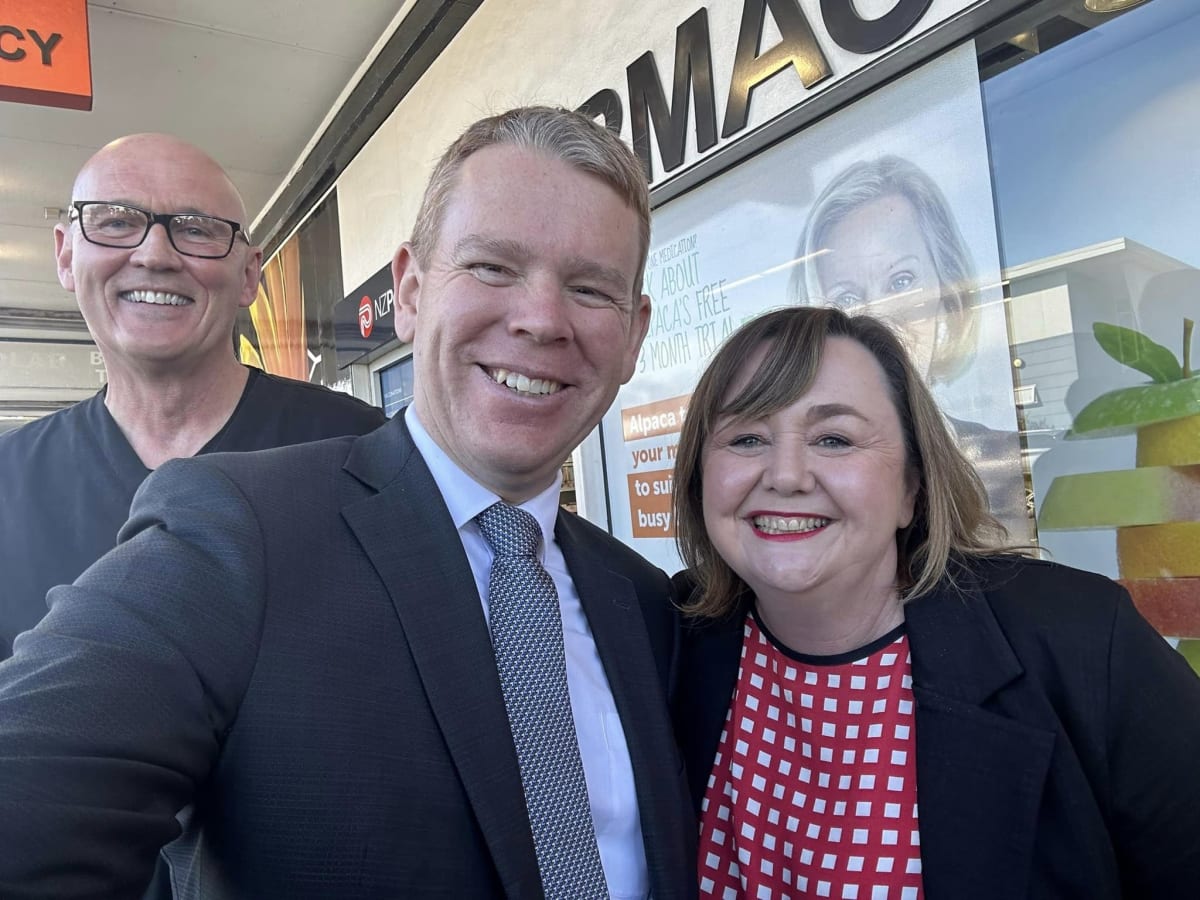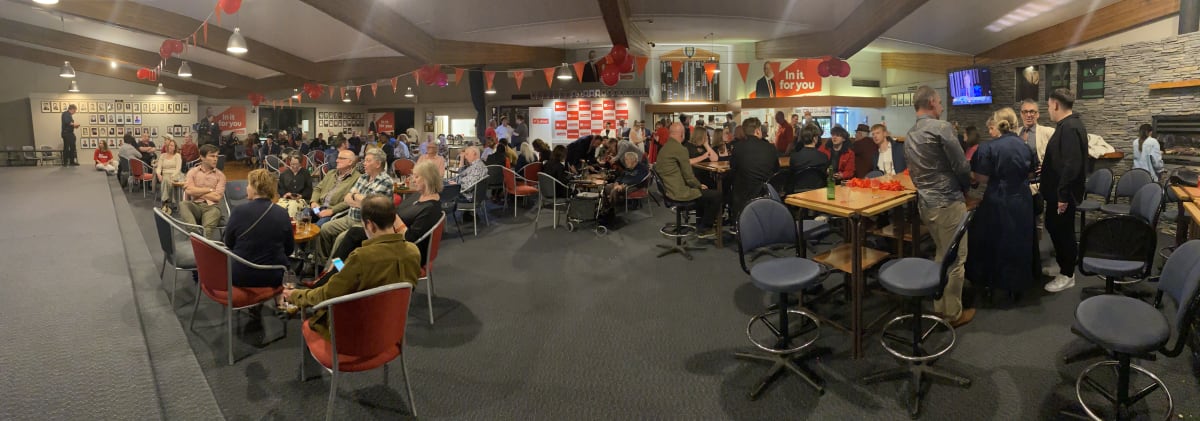
A yawning gap between National and Labour doesn’t get Megan Woods down
By the time we reach Megan Woods on Saturday night, she’s deep into rounds of media interviews. Between them she’s being brought glasses of water.
After our interview, though, she’ll grab her first glass of chardonnay, she says.
READ MORE: * Tears in Christchurch as Chippy concedes * Stark messages in a Labour stronghold
We perch on a couch in the entrance of the Linfield Cultural Recreational Sports Club in Bromley, Christchurch. Across from us, volunteers seated at a table check visitors on a list of names.
Former Christchurch East MP Poto Williams – who will be succeeded by Labour’s Reuben Davidson, if the election night result holds – waves on the way out.
“See you in two weeks,” Woods tells her.
To the results, the Labour campaign manager says it’s a tough night. But she holds a flicker of hope for a slight shift, at least.
“Labour’s real surge and pick-up in momentum has happened in the last few days. So many of these votes that have been counted, a vast proportion of them were the early votes. Some of those were cast 10 days ago.
“What we’re seeing as some of the booth votes are coming through, from the booths today, we’re actually seeing Labour pick up, particularly in some of the seat contests, and some of the party vote.
“I’ve obviously been watching the Christchurch results pretty keenly and we’re seeing some of that party vote tick up in those seats. So I think there’s still a long way to go.”

At the time of speaking, Woods looked to have won her Wigram electorate ahead of National’s Tracy Summerfield. Did she expect such a close race?
“This was always going to be a really tight election,” Woods says.
“I first won Wigram with 1500 votes so this isn’t new territory for me, and I think everyone knew that the results of 2020 were never-to-be-repeated majorities.”
Now, though, Labour is staring at a loss of 30-odd seats. But they’re not just seats to Woods.
“It’s always tough when you do lose those friends and colleagues.”
Based on last night’s numbers, Ilam MP Sarah Pallett had already lost to National’s Hamish Campbell – a return to National for an electorate that dumped long-term MP Gerry Brownlee in 2020.
Woods described Pallett as a hard-working MP, who didn’t win because of a split vote with The Opportunities Party leader Raf Manji, a two-term city councillor who ran as an independent in 2017. (Together they got more than Campbell’s 15,107 votes.)
“Sarah went into this eyes wide open – that Ilam was an exceptional win in 2020, and she’s devoted three years of making the most of her time as the MP for Ilam.”

Where did things change for Labour over the past eight-to-12 weeks?
Woods says it will take time to look at geographical differences around the country. “We can see on the way the current numbers are sitting that there’s a number of Auckland seats that probably are results that we wouldn’t have expected.”
Why is that?
“This is all post-match analysis. Talk to us about that in the coming days.”
Isn’t it the old adage, it’s the economy, stupid? Isn’t that the biggest factor in these results?
“Without doubt cost of living was a huge part of this campaign.
“But equally I think the economy did feature in terms of people having to analyse what was in it for them. I think there was quite a bit of confusion for people through the campaign on this.”
It’s “way too soon” to talk about a new Labour leader, Woods says. But did Labour leader Chris Hipkins boost Labour’s chances?
“I think Chippy did a remarkable job. He’s come in seven months ago, taking over from a phenomenal leader in Jacinda Ardern and has done a phenomenal job himself.
“A difficult ball to pick up for anyone – we seem to be using a lot of sporting analogies here – but he’s done an incredible job.”
She hadn’t talked to him, she says – having been quite tied up answering media queries. But she will at some point in the evening.
If the final count does end up under 30 percent, though, what kind of result is that for Labour? That’s a conversation for later, she says.
On TVNZ’s Q+A programme this morning, Woods said: “That mood for change was just so strong out there.”
Turnout was relatively low in some seats, including some considered Labour strongholds in Auckland.
Many Covid-incumbent governments had been ousted around the world, Woods said. Asked what could have been done differently on the campaign, she said it was too soon to make that call.
“We’re going to have to go back and have a look at that.”
She also wouldn’t be drawn on whether a more ambitious campaign, including tax reform, would have been more successful. Once special votes were counted, in early November, there could be some close electorates switch to other parties.
“It is still a live question what the shape of the government is ultimately going to look like, in terms of whether or not New Zealand First will be required to make up a majority.”
If Hipkins wanted to stay on as leader he would have the Labour caucus’ support, Woods said.







